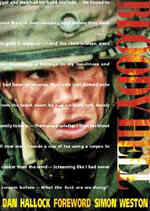
|

|
“I’m not interested in war anymore. I’m not interested in the reunions, getting together with the old mates and patting each other on the back, saying, “Damn, didn’t we do a good job?" What, shoot and kill and bomb their side? Lovely. It’s a job. If you somehow come out the other end the winner, you’ll find there was nothing victorious or glorious gained in the conflict.
“The only winners are the financial houses, the arms industry, and the politicians who’ve used the system and current affairs to aid and abet their desire for power.
“Then you’ve got two sets of soldiers, which are the losers and the losers. It’s just a matter of who loses most heavily. There are no winners.
“And afterwards... afterwards, an inescapable truth remains: you have to live with yourself. And if you can’t live with yourself, then there’s no point in being alive.”
— Simon Weston
from the
Foreword
Reviews
“Seldom does a piece of writing knock one down. But Bloody Hell does just that. It is at first shocking, then compelling and ultimately life-changing.”
— Regeneration Quarterly
“This awesome paperback emphasizes the horrors of battle, and is probably the most powerful anti-war book that you will ever read. If you believe war is all about duty, honour, patriotism and Queen & Country, don’t dare to open this book... Powerful, disturbing, and compulsive.”
— Combat and Survival
“Bloody Hell is a refreshing, honest, grim, collection of personal experiences of the true face of war. It is a timely antidote to NATO’s attempt to anesthetise war by relying on high-level bombing tactics against Yugoslavia...”
— Richard Norton-Taylor
The Guardian
“Bloody Hell cuts through the ’statesmanlike’ bullshit with which career politicians cloak their determination to send the young men of each generation to die in a foreign field... Should be required bedtime reading for Tony Blair, Bill Clinton, and Jamie Shea.”
— Karl Dallas
The Internet Review of Books
“Although I have used All Quiet on the Western Front in my classes for the past thirty years, I am replacing it with Bloody Hell. This is a remarkable volume...”
— Joseph Fahey
Manhattan College
“As this terrible century draws to an end, these poignant and searing testimonials give an unusually valuable perspective on its horrors, and show us how we can and must ensure that this shameful chapter of human history is closed for good.”
— Noam Chomsky
author of
What Uncle Sam Really Wants
“This book offers us the portrait of war as searing as any work of Goya and a revelation of war as the ultimate lunacy. The personal accounts tell it all. A powerhouse of a work!”
— Studs Terkel
“This is a wonderful oral history of war veterans, unique in its sweeping coverage of many military adventures. It is a poignant and revealing portrait of war seen from the bottom up. Let us hope it will be read by young people all over our nation, as a sobering reminder that we must have no more war veterans.”
— Howard Zinn
author of
A People’s History of the United States
“Bloody Hell debunks the myth of glory and warriorhood.”
— Mirror
London newspaper
“Soldiers have always told their tales of war, but in Bloody Hell they go further and lay bare the horrors, nightmares, and nagging questions that haunt their lives.
“Veterans of every major war in this century reveal the real price that soldiers pay, exposing the chasm between the recruiter’s sell and the realities of the military machine.”
Excerpt from chapter 3 of Bloody Hell:
The Sell
http://www.plough.com/usa/peace/bloody_hell/sample.htm
The art of military recruiting is an ancient one. Militaries throughout history have used the darker side of human nature to their advantage and have long understood that “the passions that are to be kindled in war must already be inherent in the people.”
In time of war, those passions are more base, more immediate. Young men are driven by hate and fear, not only of the “enemy,” but of the reactions of friends and family and society, should they fail to conform. Many would rather die than risk disapproval and loss of respect; would rather have their blood ebb away on distant sands than turn against the tide of common emotion and expectation. As Vietnam veteran and author Tim O’Brien observed, “The soldier’s greatest fear [is the] fear of blushing. Men killed, and died, because they were embarrassed not to... They were too frightened to be cowards.”
In times of so-called peace, these “inherent passions” are less immediate but can be exploited nonetheless. Ambition, pride, elitism, and wanderlust; the quest for physical prowess, power, and control — all these are engendered by familiar slogans like the U.S. Army’s “Be all you can be” or Britain’s “Army soldier: be the best.”
We make much of cults whose leaders deceive naive followers and lead them down paths of death and destruction; the ire of the American public is kindled at the very mention of Jonestown, Waco, or Heaven’s Gate. But what would people say if they were to learn of an organization that entices hundreds of thousands of teenagers into its ranks each year, offering money and adventure, a new family, a new identity, and a promise for membership in “one of the most elite organizations ever created”? And what if they heard that this organization makes it illegal to leave, and imprisons or shoots members who try? What if they were told that the leaders of this organization systematically corrupt the morals of its new converts, teach them the dehumanization of whole nations and classes of people, take them to foreign countries, put weapons in their hands, and force them to kill?
Wouldn’t such an organization be perceived as one of the biggest cults of all time?...
About the Author
 Dan Hallock, a graduate of Cornell University, did active duty in the US Navy and Marines and worked for a major defense contractor in the aerospace industry. He now works as an engineer, designing equipment for people with disabilities.
Dan Hallock, a graduate of Cornell University, did active duty in the US Navy and Marines and worked for a major defense contractor in the aerospace industry. He now works as an engineer, designing equipment for people with disabilities.
Hallock, an expert on veterans’ issues and the human cost of war, has interviewed over 100 veterans of every major conflict in this century for his book Bloody Hell. While soldiers have always told tales of war, in Bloody Hell they go further and lay bare the horrors, nightmares, and nagging questions that haunt their lives. Dan says:
“This book is not mine alone. Rather, it is a collective effort — the work of countless ex-servicemen and friends who poured their hearts and minds into its pages. It is a project that will never really be finished, because I hear new stories every day...”
From the Plough Reader:
For this book [Daniel Hallock] interviewed dozens of men and women who served in their nation’s armed forces. In Bloody Hell they relate frank personal accounts about their journeys from guilt and confusion to peace and hope. Many of these veterans came home from active duty feeling used, betrayed, and sidelined, swearing they’d never let war happen again to anyone. In Bloody Hell they speak from their homes and workplaces, from hospitals, prisons, and homeless shelters, breaking their silence to educate a new generation before it’s too late.
Recommended reading for all young readers facing the issue of military service.
“During the so-called Kosovo crisis a year or two ago, the New York Times ran a piece about a squadron of bombers that flew regular roundtrip missions from a midwestern state (Kansas, I think) to Serbia. The pilots would leave home early in the morning, park their cars and pickups at the airbase, cross the Atlantic, release their deadly load, and fly home in time for dinner the next night — all without stopping. None of the pilots interviewed had witnessed the destruction they had caused; some hadn’t even taken in the landscape they had flown over.
“Publicly, at least, these pilots expressed satisfaction at a good day’s work and a job well done. But a recent letter from a friend of mine who loaded bombs into F-4B Phantoms during the Vietnam War makes me wonder what their private feelings are, and what they’ll feel thirty years from now.
“My friend wrote:
“I never went into the field, but our planes rained destruction from the sky. I haven’t been able to stop crying. It all comes back; it can never be forgotten.”
— Daniel Hallock
Also by Daniel Hallock:
- Hell, Healing, and Resistance
- Six Months to Live: Learning from a Young Man with Cancer
Related site
WAR is HELL
http://www.warishell.com/warishell/index.htm
This site has several excerpts from the book wherein American and British veterans give accounts of their experiences and actions. Brian Willson is inspiring, a veteran with a real human conscience. But other accounts are the gruesome, hellish experiences of vets who feel more sorry for themselves than for their victims.
One in particular is enraging, a psychopathic Vietnam vet named “Lee.” He was driving a truck in a U.S. Army convoy in Vietnam when an old Vietnamese man coming the other way on a bicycle tried to ride past. Because Lee hated the Viet Cong (for daring to defend their own country) he decided to take it out on this old man. As he rode past, Lee took off his helmet, reached out the window and bashed the old man over the head with it. The old man fell off his bike and was run over by Lee’s truck, and then by every other truck in the convoy. Apparently Lee and all the other U.S. Army drivers thought that was pretty entertaining.
Lee had a Vietnamese wife and they had a daughter. Sometime after the baby was born Lee was scheduled to be shipped back to America. But the racist U.S. Army brass wouldn’t let him take his Vietnamese wife and child with him. The day before he had to leave he met his wife and baby on a cliff above the sea. His way of saying goodbye was to take his pistol out of his pocket and shoot his wife in the head. Her blood gushed out all over him, and presumably, the baby too. He says he cried and held her body tightly for awhile, the baby screaming between him and the corpse of its mother, then finally he pushed her — and the living baby — over the cliff into the sea.
Be all that you can be — in the U.S. Army!

Related books
Body of Secrets:
Anatomy of the Ultra-Secret National Security Agency
by James Bamford
In 1962, U.S. military leaders had a top-secret plan for committing terrorist attacks on Americans in Miami and Washington D.C., while blaming Cuba. Codenamed “Operation Northwoods”, the plan was intended to provide the propaganda necessary to create popular support for an invasion of Cuba.
The Fire This Time:
U.S. War Crimes in the Gulf
by Ramsey Clark
Desert Slaughter:
The Imperialist War Against Iraq
by the Workers League
The Hotel Tacloban
by Douglas Valentine
Killing Hope:
U.S. Military and CIA Interventions Since WWII
by William Blum
Rogue State:
A Guide to the World’s Only Superpower
by William Blum
To Kill A Nation:
The Attack on Yugoslavia
by Michael Parenti
The Beast Reawakens
by Martin A. Lee
Blackshirts and Reds:
Rational Fascism and the Overthrow of Communism
by Michael Parenti
The Real Terror Network:
Terrorism in Fact and Propaganda
by Edward S. Herman
The Phoenix Program
by Douglas Valentine
Apocalypse 1945:
The Destruction of Dresden
by David Irving
A People’s History of the United States:
1492 — Present
by Howard Zinn
Saving Private Power:
The Hidden History of “The Good War”
by Michael Zezima
What Uncle Sam Really Wants
by Noam Chomsky
Against Empire
by Michael Parenti
The Sword and the Dollar:
Imperialism, Revolution and the Arms Race
by Michael Parenti
Western State Terrorism
Alexander George, editor; essays by Noam Chomsky, Edward S. Herman, Gerry O’Sullivan and others
Terrorizing the Neighborhood:
American Foreign Policy in the Post-Cold War Era
by Noam Chomsky
Pressure Drop Press, 1991
Pirates and Emperors, Old and New:
International Terrorism in the Real World
by Noam Chomsky
The Culture of Terrorism
by Noam Chomsky
Deadly Deceits:
My 25 years in the CIA
by Ralph W. McGehee
Derailing Democracy:
The America the Media Don’t Want You to See
by David McGowan
War At Home:
Covert Action Against U.S. Activists and What We Can Do About It
by Brian Glick
Lies My Teacher Told Me:
Everything Your American History Textbook Got Wrong
by James Loewen
Dumbing Us Down:
The Hidden Curriculum of Compulsory Schooling
by John Taylor Gatto
The Habits of Highly Deceptive Media:
Decoding Spin and Lies in Mainstream News
by Norman Solomon
Manufacturing Consent:
The Political Economy of the Mass Media
by Edward S. Herman and Noam Chomsky
Inventing Reality:
The Politics of News Media
by Michael Parenti
War, Lies & Videotape:
How media monopoly stifles truth
edited by Lenora Foerstel; multiple authors